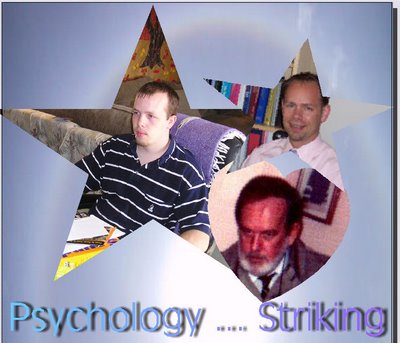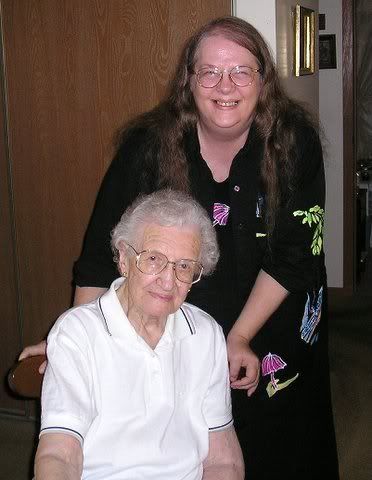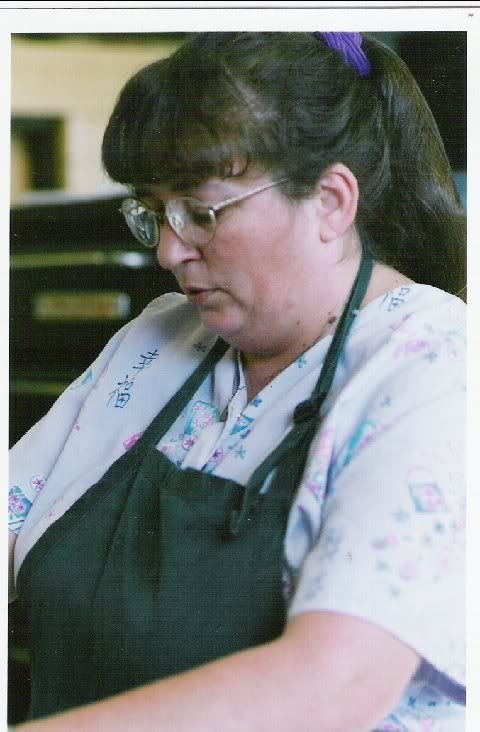Woman of Psychology in Session

These are all my psychology super stars. I want to be in their world of psychology. Each of them can be steadfast. Deep breath … YOU ARE GOOD ENOUGH! BE STRONG! CHOOSE GOOD! SIT UP … WRITE!! Yes ma’am. Ok.
Paper …
Topic: u07d2 Problem Solving Date: May 29, 2006 2:03 PM
Subject: In response to the assignment from Ann
Last edited on: May 29, 2006 3:22 PM
There are seven steps in the problem-solving cycle (Sternberg, 2003). The first step is to identify the problem. The problem that I am going to use is - resolving the needs as a multiple in order to focus on the high-end day-to-day concentration tasks such as school. The goal is to be working on the tasks. The goal is often distracted by multiple multiple needs. We keep trying to better our system, because at the present time, the system isn’t producing well enough. We are glad for the opportunity here to reevaluate the system. It seems that each day, we grow smarter and more creative in not only defining the problem, but also perpetuating the obstacles. More depth does not necessarily mean forward momentum. Although the system bulks, the need of completing tasks on deadlines presses on and if we don’t figure out how to improve the system, we risk losing everything we’ve worked toward and would like to accomplish with our education and career.
The second step of the problem-solving cycle is defining and representing the problem. Multiples need to work with all of their parts in getting the one “family system” going in the same direction. One part of the problem is that as a whole, we’ve made commitments to be educating ourselves without much expertise on maintaining schedules and routines. It seems as a system, we need to resolve the needs of each 20 parts as a process of working toward the main goal of reading and writing papers and discussions. It’s like give and take. For example, in this last two weeks, we’ve had to take care of the emotional needs of our doctor on vacation, the on-going need to do our personal writing, which assists in balancing what happens to us collectively, complete difficult work assignments, and move our general household life in a forward direction. There is also maintenance of social relationships, including friends and family. Not all parts of us do all these tasks consistently and some parts umbrella themselves by putting aside their immediate needs to assist other parts; much like a mother putting her children to bed because he is tired and she doesn't want him to be overwhelmed, but will then later put herself down so she also doesn't get overwhelmed. The younger parts and the older parts go forward in time together. Per se, there is no other major priority that has to be worked on after work/office hours, other than what’s been mentioned above. We don’t have habits of television viewing and usually only one or two people will stop by our home over the periodic course of a week or month. We tend to stay at the computer about 9/10’s of our waking hours and all gets worked out from “the safety” of this station with the utmost priority being school. But, inevitably, we have to make immediate choices to start the next school task, or satisfy needs of those of us who develop other priorities, many times in direct opposite correlation of the need to focus on school tasks, especially in consideration of time consumption. A set of problems, we will not resolve at this time is that of being collectively depressed, anxious, or compulsive-obsessive. While none of these help, they are only secondary obstacles.
.
The third step of the cycle is to formulate strategy. Given the above, 1) it would not seem we are going to change from being a multiple to a singleton, nor are we going to stop cycles of depression, anxiety, nor obsession, so we are going to need formulate strategy that is affective in refining the problem, which seems a good idea because it allows the writers and the students to work together through an assignment as well. 2) If we stop going to school, then we lose what we value most in the learning processes and secondarily, we would need to start paying back school loans without having earned a higher income to pay the debt. 3) Most important is to avoid being crushed as potential dissolved. We’ve set a ten-year plan to carry out the school mission, and this is what’s important to do with our life. We feel most like ourselves when writing and psychology has given us our balanced course and direction. It would seem to get the parts going in the right direction might be only a half fallacy. Because essentially what is realized is that whatever their needs are are our needs too, and in reality most the parts believe they really are helping, and usually in a round about way do help, just not on deadline.
An example of a typical day would be that someone wants to read the text assignment out on the balcony to avoid younger parts becoming overly comfortable and sleepy on the couch, but that draws out another part who is terrified of being away from the computer, especially outside. This runs parallel to the next dilemma of someone trying to learn picture taking, because she’s figured out it will help the first part move about in space and would make a nice storybook birthday gift for Grandma. Meanwhile a part who’s taken responsibility at work for a technology management plan gets pushed to resolving the issue she’s been stuck on in backing up the administrative computers, so she buys a memory devise, which terrifies the two that do the budgeting. So with one over-expenditure in hand, we find yet another part who has decided, “Well if that part can get a piece of technology, “so should I!” Because she’s waited longer for her purchase and it wasn’t even as costly. This pretty much tilts all budgets, and now the younger parts being treated out to daily Slushies for doing good work at work (being patient and not demanding out time while others are working) are suffering the older parts financial crises because someone refuses to dip into deeper cash reserves for pocket change. In turn the younger parts protest by refusing to go to bed on time. This goes on into infinity. It is not that the system isn’t working together; it may be more likely that there are just too many diverse needs and creative problem solvers; each ultimately trying to do the best for themselves and others, but as one doctor stated, we have trouble in being able to maintain steering control of the ship. So, I would think the correct strategy is to rally around one management tool in steering the ship. We've have an appointed leader, but we've not been able to make one part more responsible for all the others, as much as teach the doctrine that everyone has to learn be responsible for self and our projects.
The strategy we are working on right now is using the PDA. In the past and continued in the future, we utilize a blog as a running set of notes so that we all can touch bases with each other. But, it is cumbersome at times, because there is insecurity leaving it, or in over-explaining or justifying our case to others. Often the blog is expensive to run because of the cost of time. Parts are having trouble giving up the ground, because what is being written seems like the most valuable part of who we are. Most the parts want a turn, and sometimes parts just have to take breaks and let others have there turn. It is often “Wait, wait, one more thing …” I think now this is a stalling technique to gain more time “out” where they are the one who gets to make choices and direct energy and time. As good as the system is in communicating satisfaction or need, we get sidetracked into peculiar issues of separate parts instead of working more directly on our joint school tasks. Most of the work this last couple of weeks has been securing and advancing our technology department. We’ve added the double screen, flash memory, camera mobile and fixed, and PDA as the primaries. The significance of the PDA, which has been developing amongst parts, is to now utilize it as if it were the ship’s log. By that, I mean our strategy is now that the parts have to note in the “ship’s log” change of direction. The wheel itself would be our single or joint conscious attention. In so doing, each part has too look at agenda items listed by others, while being a Christopher Columbus in aiming toward the solid grounding of school, work, or living. Nothing more than a sentence and the items listed have to be checked off as getting done before adding a major directive change. The PDA should become a short-cut version of the blog, which does work, though bulky as a winter coat in spring.
In organizing information, we realize a lot of energy and time has gone into perfecting the variables including the needs of self and others. We’ve also had to plan around actions that would relieve the stress of parts being overwhelmed. Information from one front would affect different the actions on half a dozen plains. We’ve often left each other in unknown labyrinths, because there is never enough time or energy to complete actions to satisfactory levels of task completion, sense of achievement, or in docking. There is also a lot of horse trading. Like parts are giving and taking one thing or another to get something else, which gets tangled and confused. Along with the technology advances there have been personal relational needs exposed in losing our psychiatrist’s time and adding more time with a Grandmother who we had lost contact with, but along with that switch, we’ve lost some of our best support and took over more anxiety, in fear of being exposed to other “family.” To shore this front, we’ve worked harder at relationships with our own sons. Our friends remain stable. It might seem at first “odd” to utilize so heavily the PDA as our mapquest, especially toward work and school, but we need something that will be with us wherever we are at. Because of our moderate memory impairment, we’ve known for quite a while our best chance of succeeding is in our writing things down. The family set of complications involves most importantly our own sense of self. Basically, we as parts have always considered ourselves part of a system, where we are trying to accept we are more like parts of our own family, which is unnerving because family has in the past been unraveling. We are going forward with it though, because it makes sense as a major progression.
The allocation of resources is always a challenge as mentioned above with time and energy. We’ve struggled with deadlines for a long time, especially noted at work. We still have considerable lag time. There is more pressure wanting to do more with your life. Often we fall prey to manipulation of our financial resources. I might not know who I am in 2 days, but I can be pretty sure if I order something over the computer, I will know within three days time the new object will be concretely available to us. With money and purchasing one has a sense of control and order. Because, we had available extra money, we built up our stock of assets, which in turn like most tasks involve time in learning and practicing. This is much more the case with multiple parts of us learning. Each of us has better or worse learning curves and to avoid diversification, it is better when more work together. The idea of working on the larger picture is very sound. Like now in considering “all the parts,” we feel some sense of things being better, whereas tangents often mean we’re lost in space. The sense of control, though is most likely a façade, because to admit honestly, real control takes place within the self. In this respect we have to acknowledge that the PDA is an outside object, but that it is an object simple enough to be usable to most parts concerned. We need to internalize its form.
So far in monitoring, we are doing pretty good with the devise, though it is too new an idea to be sure. This one has developed over a long period of time, so that is in our benefit. There has been a lot of building up to this point. A lot of good ideas exchanged. And, the familiar sense as if everything is going to be ok. The reassessments will occur as we find parts trying to break from the mold. If we are handing in assignments and completing the course, then we have found a system that is working. Another marker event is when we feel confident enough in completing the course that we schedule another course for the next semester. Yesterday while with our son, we commented positively to him our sense of confidence in him, because of his fluidity. His life has bumps, but they are more like gradual dips that he simply adjusts to. There is always the feeling he is moving through time efficiently and effectively. We could only know this if we’ve been there, done that and appreciated it for what it was worth. In a like manner, we can do this … just need to “progress.” We are doing that.
The only evaluation we can make this far is that it “feels good.” I can know by the fact we’re finishing an assignment. There is a little uncertainty in that I don’t know if our thoughts are too strange for the assignment format. I have enjoyed thinking through the steps and it leaves us with a familiar marker that school itself is not as much foreign to one’s progress with its new information, but complimentary. This sense of completing small tasks also works in our favor, because it allows our minds to work around start to end projects which are very satisfying. The insight would be to hold the knowledge consciously that school is not overwhelming while it is being directly worked on. We know we are smart enough to do the work. We’ve just been struggling in our self-management. With a plan in place, and with no objections coming in thus far, I can say we look forward to the next task. One last consideration … along with the directives being made in the PDA, we are getting better at being self-encouraging, which assists in balancing out our feelings of loss with less working time with our psychiatrist.
The advantage to becoming an expert problem-solver for the problem we have addressed is that for one it would allow us a strong advance in our growing interest in goals and to some degree over choice-making. The goals consideration has been an active part of our considerations over the last couple of years, particularly while at work. I think a major responsibility we have at work is to lead others to learning goal-making. But, we have realized all along that it was up to us to lead by example. The unfortunate part of this is that we have parts that also want to be invisible rather than to lead. We’ve had a lifetime challenge in not sabotaging ourselves, or in holding a global respect for who we are and what we can do. If we became an expert in what we were doing, we would be able to pass good information to people we work with and our sons. We find often our friends are running parallel lives. And, we hope to be a more constant support for our grandmother now in her 98th year. My Grandmother is someone we’re consciously choosing to spend time with. The disadvantage to being a problem-solver is that more people come to you wanting to depend on your resource-abilty, so this has to be watched carefully. It is more acceptable teaching people to be independent individuals than to depend on another to take care of needs that aren't theirs. One friend has taught us, for example, that while it is important to work, it is also important to come home from work at a decent time to be working on personal goals.
The process of selective-encoding insights is to filter out what one’s mind(s) doesn’t need and to secure information that is essential. Having a selective-comparison insight is the unique individualistic ability to perceive old and new information to reach for something more. Selective-combination insight is the combination of being selective in encoding while then comparing material gathered to for a superior answer. For example, in consideration of the problem-solving work done previously, we knew and left a marker (encoded) the information that it was a good idea to purchase the PDA. But, it was not figured out why or how we would use it until today. Also, an another old idea left encoded in reserve was the marker thought left by our retired psychiatrist that we had difficulty maintaining the steering control of our selves. When tension again rose in the process of school tasks needing to be completed, we combined old knowledge such as the above and old knowledge of writing things down with new information in that, until the day we read up on PDA’s and purchased the same day, we had no idea how, or in which way a PDA was going to work for us. It was a particularly tense situation where guilt was involved and needed to be surpassed, because in not understanding its usability, we’d made a considerate monetary investment in the product.
In the process of selective-encoding you are in a sense practicing good gardening skills in sorting out the corn from the tomatoes and peaches while raising awareness which kind of cultivating and harvesting each would need. In comparison, selective-comparison is more like studying what is known and what one is learning about growing a new type of seed that is new to the area of your home town. Although you’ve gardened for a long time, the information gained from old and new knowledge will be insightful. Selective encoding is more a process of analysis where selective comparison is more a process of synthesis. In encoding you are breaking down the elements by category. With comparing you are building new theories. With the combination of both, you would have achieved a Gestalt. The only weakness of the first two is that each doesn’t directly suggest an element of each other. The weakness of the combination is that it doesn’t incorporate all knowledge of insight.
Sternberg, R. J. (2003). Cognitive psychology (3rd ed.). Belmont, CA: Wadsworth/Thompson Learning.
End Paper

Good morning It’s me again. We’ve been up for about a half hour or so now. We’ve had a few smokes, some cold coffee, fed the kitties, warmed up AND passed a few notes between Nikki and us … sure do love that woman! She makes us smile to beat the band! But, now we have to be moving on. We’re doing pretty good with steering the ship so far, though had to scold the one who got watermelon off target. Just a tiny scold. The one who wanted just one look at the pictures was all good. Now, we get a tiny little bit of MPD and then we need to start on the next paper.
I wanted to say that I got another chance to talk to my Grandma. We talked about all kinds of stuff like I found out she has a meat grinder and makes hash from left over meats she puts in a little plastic contain in her fridgerator. She then fries it up watching carefully so it doesn’t scorch and she adds things like diced potatoes and onions to it. It sounded wonderful! I never knew! I think she was a little nervous when we first called, because we talked about the severe weather they were expecting up there with rain and gusting winds. We talked about evacuation plans and finding the safest spots in the house. I don’t think she thought her roof was going to blow up, but she was still thinking of it anyway. I said at the end of that conversation, best not to take my part of the conversation over seriously, because sometimes I feel we’re a bit of an extremist. But, over the course of the conversation between us we depressurized the system! I think it had been so hot up there in MN, that they were in their upper 90’s. Her apartment is air conditioned, but I don’t think they had it on for the main halls and such so people were staying in their apartments and that was no good. We reminded her that what she had done with her friends in protest was good thinking. I was very positive in meeting with others so they had more control over their living situation and that she continues to talk to my Uncle, because he’s always seemed to help her a lot. I know he’s not intimidated by making a well placed call when necessary. He’s got a firm right upper hand.
There was a little part of the conversation that reminded me that she was still a little intimidated by the thought of being too old to stay by herself. But, she feels strongly that she isn’t ready for the other, and I see absolutely no sense in being in a nursing home either. She still cooks and cleans and gets around every day, so there is no reason she should be limited to a one bedroom home. She is still tiring and says that it will be ok when her time comes. She was somewhat encouraged that one of her older brothers was driving at 100 up to a week prior to his death. She said like many he had gotten Pneumonia. I think he died last summer. She appreciated that he lived alone too and took care of himself. I think it is a matter of honor and pride in our family to not be a “burden” on others. I think she’s trying to teach me to toughen up in that I recognize that she gives me little hints on how to get along better for myself. Such as in making the hash. She says that she doesn’t do much cooking of cakes and cookies, because it is just herself and I think she is a little frightened to get into a big cooking session because if she got into a weak spell, she could lose control of the kitchen. She says that things like the hash or soup are good, because she just has to turn off the stove. She also says that after she starts cooking something she stays close to monitoring it. I think her memory is better than ours, in that we need to use the timer. Hehehe she says she has a friend that still likes to do things with candy. I’m not sure whether it was home made or purchased, but sometimes if people weren’t around, she would leave it on the puzzle table, because people would know it was from her and help themselves to it and my Grandma said it gave the woman the greatest pleasure in sharing with her friends. That’s some pretty cool stuff!
I also got a lesson on how to make homemade chicken soup. She says she makes about three thighs at a time by boiling them in water, then uses the strained broth with bullion cubes and adds onions, carrots, and celery. She says she has plastic containers to put in the freezer with the extras and doles it out from there. We’ll have to remember this. Oh yeah, she says she uses roman noodles too. I know our friend makes good soups, so we’ll run that one past him … by the time we could try it, we’ll need more directions on how to use the stove in amount of time cooking chicken and stuff. We were too dazzled to get down to the real basics with my grandmother, specially because she tires so easy and we have sooooo much to talk about. Another part of the conversation I remember is that we are both needing to consider for safety having cell phones. Our friend says he wants to consider it seriously for my birthday. But, I am still not appreciative of the darn things. Just think they are so invasive. It seems rude to me that people are on them every moment they can like walking down the hall, or in elevators, or at restaurants, or like my friend when we’re driving together. It’s to a point, I would rather follow him in my car to a restaurant after work than drive with him. I hate to be put on hold while he’s having phone conversations. Most of them are business related, but I still don’t want to hear it. But, our Grandma and us advanced the conversation anyway. She said she was waiting on someone who worked at a cell phone company, I don’t remember which. And, I said that if your just waiting to talk to someone not on your regular callers, that I might as well just look it up on the Internet. Hehehe she’s still not quite thinking of computers, but I think having a cell phone at 98 is pretty modern thinking. I think she would get out a little more if she could know she wasn’t going to miss calls. My Grandmother talks to people all around the country. We talked about etiquette in that she says when they are sitting out on the porch sometimes people get calls on their cells. We agreed it would be good manners after you got the call to walk away from the people so you don’t interrupt the flow of their conversation. YAYY!!! We progressed things!
The problem my grandma is having with getting a cell phone is that she is hard of hearing and wears a hearing aid. I think we discussed before she’s lost hearing all together in one of her ears. In looking around last night I found some information, but not a lot. The best info seemed to be from a company called Audex who are working with Nokia on a devise called the Chaamp, which inserts between the phone and the battery. There are other devises that can be worn around the neck that do something to cut down on the interference. With those devises you put the phone itself in the pocket. I don’t know how much she already knows because of what her friends use. Maybe her friends aren’t hard of hearing like her? Not sure … but, we’ll advance the conversation more next time we hear from her. One of the neat things about our talking last night was after Jacob being here, we found the head phone devise we’d originally bought for our phone. It is for just one ear and is very light. The hearing and microphones are both great. Neither of us had a lick of trouble with it last night and it freed up my hands for typing while I was talking with her. I found myself taking a few notes so I would remember better. That was really good thinking.
Hmm, that was some of the basics from the call. We ended up the call talking about what would be happening this week. Thursday is her birthday. I think my mother is going down tonight. They will visit tomorrow and Wednesday she’s supposed to do grocery shopping for my Grandmother and do stuff like that. On Thursday, my Uncle and Aunt will meet them and they will go out to dinner. And, on Friday two of my unknown long distance cousins will be coming in. In the meantime, everyone and their brother will be calling in to wish her a happy birthday. My Grandmother has always had good communication skills with friends and family. She does notes in Christmas cards and always remembers people birthdays. In all the years of no communication between us, she’s always slipped me a card with a little spending cash. I’d like to carry on that tradition, just need to learn using the PDA better for reminders AND keep a little extra in our bank account, HEAR all you inside!??
Well, that’s pretty much of that. I see V. is up … I think he likes that we got an assignment done finally, and I’m sure he’ll be eager to see the next. He’s pretty cool that way. It’s like an unspoken agreement … If I write them, he will read them! YAYYYY V!
Better set-up next assignment … Here we go…
u07d3 Creativity :
Thoroughly compare and contrast the various approaches to creativity. Based upon current research and theory on creativity, what advice would you give to a friend who would like to be more creative in his or her work? Is a highly creative person more susceptible than others are to personal emotional challenges? If so, explain.
Ok, looks like this is covered by pages 393-399. I’m afraid that until we catch up … we might have to look through the assignments for just the right answers. But, I’m afraid we are going to lose necessary information to understand the whole. I know we can reread later when there is time, but I also know we’re cramped for time now. Might have to pull a few quick resources for this next paper, maybe not. V’s now right on top of our need for speed. Well he always is, but we’re talking in a direct parallel IM as I am writing hehehe Gotta love the V!
Paper …
The various approaches to creativity as less structurally listed by Sternberg (2003) are in defining the word loosely, asking the questions of how much creativity we produce, discussion of what we know, asking ourselves who and where we are, and a collective response, which includes all of the above. Sternberg more concretely states approaches are psychometric and cognitive, personality and motivational, and social, societal, and historical (2003).
Creativity as something “original and worthwhile” (Sternberg, 2003) is inclusive of a wide variety of experiences and abilities that produce, discover and revolutionalize. He further describes creative people as being flexible and having non-conformist attitudes (2003). The psychometric approach considers “the ability to create more” (2003). The cognitive approach include problem solving and insight and weighs in more toward the long hard work of building on a store of information created by experts, or to conceptualize convergent and divergent thinking similarly to how we’ve been considering analysis and synthesis in this unit. The cognitive approach also discusses the release from functional fixedness, especially after incubation.
In addition to these approaches are considered personality and motivational approaches. These are approaches that consider the person himself as either being endowed or not with an “openness to new ways of seeing, intuition, alertness to opportunity, a liking for complexity as a challenge to find simplicity, independence of judgment that questions assumptions, willingness to take risks, unconventionality of thought that allows odd connections to be made, keep attention, and a drive to find pattern and meaning—these, coupled with the motive and the courage to create” (Barron, 1988, p. 95 as cited in Sternberg, 2003). The third approach of social, societal, or historical, includes the gift of an individual creator being in the right place at the right time and finding life’s special gifts while not usually seeking them. Gardner synthesized a general set of traits and experiences that were familiar to many creative people, and lastly is the view point where one tries to utilize the information from all the above as conveyed by Sternberg and his partner. Sternberg’s example of buying low and selling high is an opportunistic view of looking for what others usually miss and capitalizing on or propelling ideas further before moving on to the next idea, which gives creativity the aura of responsibility and includes quality and quantity like the search for diamonds. Sternberg’s ideas of types of creative contributions appeared in the text as a directional gauge as to the creative ideas influence and could be likened to the processes of influence in comparing the collective effort in the cognitive psychology research view of explaining how one article or study might affect the next.
Pause Paper, post, and get to work! Good Job!

Remember systems explain how we work, not who we are … we are a family of US AND we're a "getting better everyday psychology student! YAYYYYYYY Us!
















